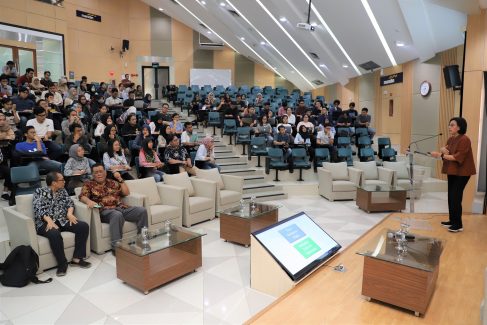Minister of Finance Sri Mulyani Explained Fiscal Policy and Posture for the 2020 State Budget in a Public Lecture on the Indonesian Economy
Nino Eka Putra ~ Humas FEB UI
DEPOK – The Department of Economics FEB UI presents the Minister of Finance of the Republic of Indonesia as a speaker and teaching staff of the Indonesian Economy course and was opened by Ari Kuncoro as the Dean of the FEB UI as well as the Chosen UI Chancellor who took place at the Soeria Atmadja Auditorium, the Dean Building, on Wednesday (27 / 11/2019).
The Minister of Finance of the Republic of Indonesia and FEB UI Teaching Staff, Sri Mulyani Indrawati, said that fiscal policy is the use of taxes, government transfers and government spending on goods and services in order to shift the aggregate demand curve. Fiscal policy on the supply side has a significant effect on the unemployment rate, potential GDP, and aggregate supply. The generational effect of fiscal policy when using the generational accounting method which is an accounting system to measure the lifetime tax burden & benefits for each generation.

Meanwhile, the impact of taxation on consumption expenditure and the occurrence of a tax wedge is that the imposition of a tax on consumption increases the price consumers must pay for goods & services to be consumed similar to the discounting effect on the real wage rate. If the Income Tax (PPh) rate is 25% and the rate of consumption expenditure is 10% and every 100 rupiahs received will only be able to afford goods / services of 65 rupiahs.
Imposition of Income Tax affects unemployment rate & GDP potential. If the number of workers employed decreases, the potential for GDP will also be reduced. The supply side effect of an increase in income tax will cause a decrease in GDP and aggregate supply. “For example, in the USA, two items in the government budget can change automatically in response to economic conditions in terms of tax revenue and needs-tested spending,” Sri Mulyani said in her presentation.
Basically, we currently hold the relay of independence and are responsible for bringing Indonesia closer to the goal of independence. One of the founding mandates of the nation is to create a just, prosperous society and to educate the nation’s life by forming a nation that is creative & innovative so that it can compete on a global level.
The main pillars of sustainable growth & economic stability are four pillars, namely monetary, fiscal, real economy and financial sector policies. Thus, structural & development challenges include narrowing output gaps, global uncertainty in the form of increased macroeconomic competitiveness & stability, increased labor productivity & social protection effectiveness, increased productivity & competitiveness, and economic & industrial transformation 4.0. Meanwhile, 5 priority government work programs amid global uncertainty focus on human resource development, infrastructure, simplification of regulations, simplification of bureaucracy, and economic transformation.
“Thus, the posture of the Indonesian State Budget in 2020 is directed to support the achievement of development targets while remaining adaptive to face economic risks. It must be maintained to support growth but remain prudent. The state budget deficit in 2020 will be maintained at 1.76% of GDP to be directed to be more healthy & adaptive in facing economic risks and optimizing state revenues accompanied by realistic targets, “he explained
He continued, the new policy taken by the government for the 2020 State Budget funds regulated in PP 45 of 2019 was Super Deduction. The regulation stipulates that in addition to spending through the National Budget, the private sector will work together to improve the quality of human resources through tax instruments to encourage competitiveness.
Thus, the government realizes Indonesia’s vision of advancing 2045 with various policies such as infrastructure development, strengthening the quality of human resources, enriching innovation & technology, government bureaucracy, good regional spatial management, economic & financial resources, and a healthy state budget to be the key to success. (Des)






